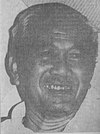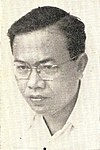
The Socialist Party of Indonesia was a political party in Indonesia from 1948 until 1960, when it was banned by President Sukarno.

The Christian University of Indonesia is a private university located in Jakarta, Indonesia. It was established on October 15, 1953, with its main campus – Campus A – located in Central Jakarta. Campus B is in Cawang, East Jakarta.

Johannes Leimena, more colloquially referred to as Om Jo, was an Indonesian politician, physician, and national hero. He was one of the longest-serving government ministers in Indonesia, and was the longest-serving under President Sukarno. He filled the roles of Deputy Prime Minister and Minister of Health. An Ambonese Christian, he served in the People's Representative Council and the Constitutional Assembly during the 1950s, and was the chairman of the Indonesian Christian Party from 1951 until 1960.

Burhanuddin Harahap was an Indonesian politician and lawyer who served as prime minister of Indonesia from August 1955 until March 1956. He was a member of the Masyumi Party and served as Minister of Defense concurrently with his tenure as prime minister. Afterward, he took part in the unsuccessful Revolutionary Government of the Republic of Indonesia (PRRI) rebellion in West Sumatra.

The Third Sjahrir Cabinet was the fourth Indonesian cabinet. It served from October 1946 to July 1947, when it fell due to disagreements related to the implementation of the Linggadjati Agreement and subsequent negotiations with the Dutch.

The First Amir Sjarifuddin Cabinet was the fifth Indonesian cabinet and was in office from 3 July to 11 November 1947.

Indonesian Islamic Union Party was an Islamic political party in Indonesia before and after independence. In 1973 it was merged into the United Development Party.
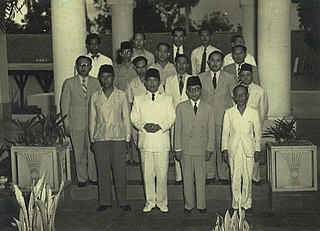
The Soekiman Cabinet, also known as the Sukiman-Suwirjo Cabinet, was an Indonesian cabinet that served from 27 April 1951 until it fell on 23 February 1952 following revelations that it had signed a mutual security agreement with the United States, and was dissolved on 3 April 1952.

The Burhanuddin Harahap Cabinet was an Indonesian cabinet, named after the prime minister, that served from 12 August 1955 until 24 March 1956.

The Djuanda Cabinet, also known as the Working Cabinet, was an Indonesian cabinet that served from 9 April 1957 until 10 July 1959, when it was dissolved by a decree from President Sukarno.
The Indonesian Peasants Party was a political party in Indonesia. The party was founded in December 1945 in Purwakarta. The party was mainly based in West Java.
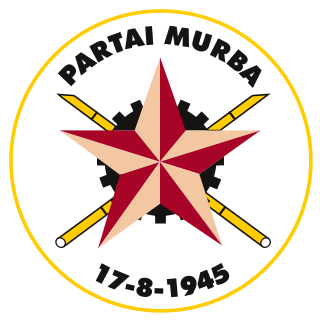
Murba Party was a 'national communist' political party in Indonesia. The party was founded by Tan Malaka, Chairul Saleh, Sukarni and Adam Malik in 1948. The history of the party was largely intertwined with that of the powerful Communist Party of Indonesia (PKI). Initially relations between PKI and the Murba Party were fluid, but gradually the two parties developed into each other's arch-enemies. The Murba Party continued to exist under the New Order, but was merged into the Indonesian Democratic Party in 1973.
The First Congress of the National Christian Party was held between 6–8 December 1945. The congress was the first congress of the party, held in one month after the formation on November 10, 1945. The congress was only attended by the party delegates from Java.

Indonesian Christian Party 1945 was a political party in Indonesia. The party was a successor to the Indonesian Christian Party, which was established in 1945. The party never passed the verification for the general election.
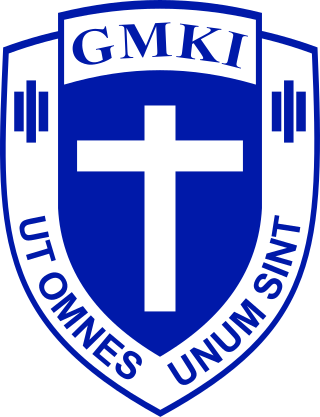
The Indonesian Christian Student Movement is the main student organization for Christian students in Indonesia. Established on 9 February 1950, it is the product of a merger between the Christelijke Studenten Vereniging op Java, which is the organization for Christian students in Java, and the Indonesian Christian Students Association. The movement is a member of the Cipayung Group and the Pancasila Front and is internationally affiliated with the World Student Christian Federation.

Jong Batak Bond, sometimes simply called Jong Batak, was a short-lived but influential Batak intellectual organization founded in Batavia, Dutch East Indies in December 1925. Like Budi Utomo, Jong Java and other such organizations, its members consisted of native Indonesian students in Dutch-language schools interested in advancing their ethnic group and Indonesian nationalism at the same time. Notable members of the group include Amir Sjarifuddin Harahap, Todung Sutan Gunung Mulia Harahap, Sanusi Pane, Saleh Said Harahap and Arifin Harahap.
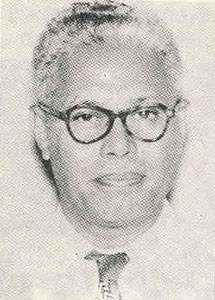
Martinus Putuhena was an Indonesian civil engineer and politician. He was the Minister of Public Works between 1945 and 1947 under Sutan Sjahrir during the Indonesian National Revolution, and in 1950 briefly served as the Prime Minister for the State of East Indonesia prior to its dissolution.

Sutan Muhammad Djosan gelar Sutan Bidjo Radjo was an Indonesian bureaucrat. He was the Governor of Maluku from 1955 until 1960.
Indonesian Students Party is a minor political party in Indonesia which focuses on youth politics. The party claimed themselves as the successor of the Indonesian Christian Party 1945 (Parkindo 1945). The party is led by Eko Pratama, the leader of student executive board confederation BEM Nusantara.


